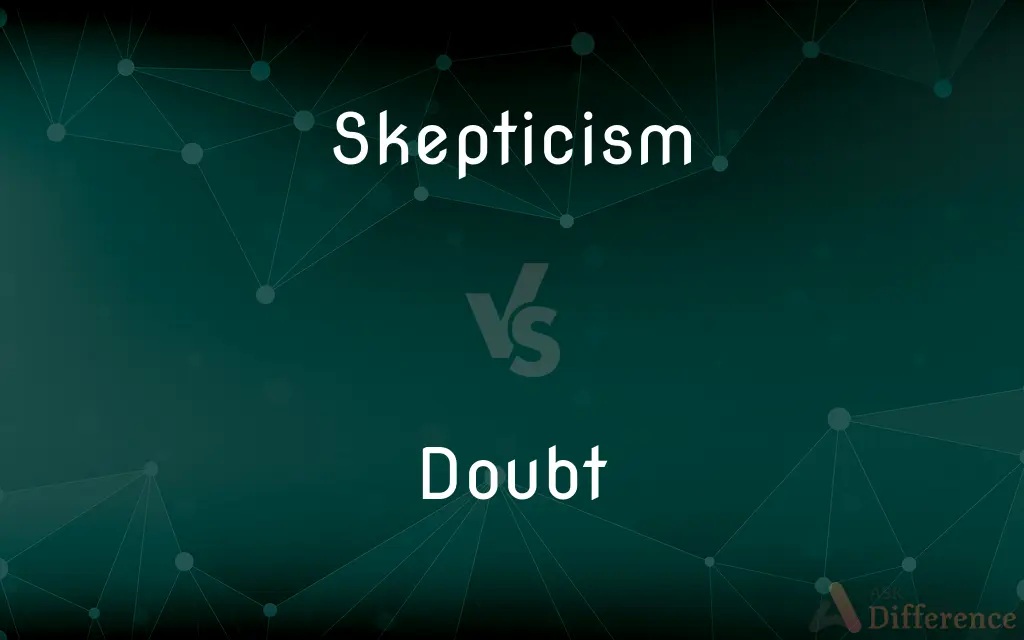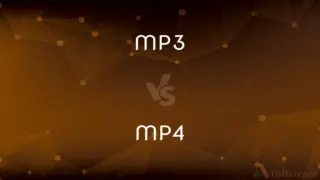Skepticism vs. Doubt — What's the Difference?
Edited by Tayyaba Rehman — By Fiza Rafique — Published on October 26, 2023
Skepticism is a systematic approach of questioning and doubting claims, while doubt is a general feeling of uncertainty or lack of conviction.

Difference Between Skepticism and Doubt
Table of Contents
ADVERTISEMENT
Key Differences
Skepticism and doubt both relate to questioning or disbelieving certain claims or facts. Skepticism is a broader philosophical position, suggesting a systematic approach to assessing the validity of claims, often demanding evidence before acceptance. Doubt, conversely, is a feeling or belief that something might not be true or certain, not necessarily requiring a systematic approach.
While skepticism might be applied methodically as a tool or mindset, especially in scientific or philosophical inquiries, doubt can arise spontaneously in various contexts. Skepticism often implies a deliberate choice to question or to withhold judgment, pushing for clarity. Doubt, meanwhile, may stem from instinct, previous experiences, or fleeting feelings of uncertainty.
Skepticism is frequently associated with a proactive stance, where one actively seeks evidence, asks questions, or challenges assertions. Doubt, in contrast, can be passive, where one simply feels unsure without actively seeking answers. It's not tied to a particular methodology or thought process.
Comparison Chart
Definition
Systematic approach to doubting claims
Feeling of uncertainty or lack of conviction
Origination
Methodical, often philosophical or scientific
Can arise spontaneously
ADVERTISEMENT
Action
Proactive: seeks evidence, questions claims
Can be passive or active
Scope
Broader, applies to various claims or beliefs
General feeling about specific situations
Associated Process
Requires a consistent method or approach
Doesn't necessarily follow a process
Compare with Definitions
Skepticism
A methodical approach to questioning claims.
His skepticism led him to question the study's results.
Doubt
Lack of confidence or certainty in a particular outcome.
The team's performance cast doubt on their ability to win the championship.
Skepticism
Systematic doubt based on the quest for evidence.
Skepticism ensures that we don't easily fall for unverified claims.
Doubt
A wavering stance between belief and disbelief.
She's in doubt about which path to choose.
Skepticism
Withholding judgment until sufficient evidence is presented.
Her skepticism prevented her from accepting the story at face value.
Doubt
Suspicion about the validity of a claim.
The evidence presented left some room for doubt.
Skepticism
Actively challenging assertions to get to the truth.
Skepticism is necessary in a world full of misinformation.
Doubt
To be undecided or skeptical about
Began to doubt some accepted doctrines.
Skepticism
A doubting or questioning attitude or state of mind; dubiety.
Doubt
To tend to disbelieve; distrust
Doubts politicians when they make sweeping statements.
Skepticism
The ancient school of Pyrrho of Elis that stressed the uncertainty of our beliefs in order to oppose dogmatism.
Doubt
To regard as unlikely
I doubt that we'll arrive on time.
Skepticism
The doctrine that absolute knowledge is impossible, either in a particular domain or in general.
Doubt
(Archaic) To suspect; fear.
Skepticism
A methodology based on an assumption of doubt with the aim of acquiring approximate or relative certainty.
Doubt
To be undecided or skeptical.
Skepticism
Doubt or disbelief of religious tenets.
Doubt
The state of being uncertain about the truth or reliability of something.
Skepticism
The practice or philosophy of being a skeptic.
Doubt
Often doubts A feeling of uncertainty or distrust
Had doubts about his ability.
Skepticism
A studied attitude of questioning and doubt
Doubt
A point about which one is uncertain or skeptical
Reassured me by answering my doubts.
Skepticism
The doctrine that absolute knowledge is not possible
Doubt
The condition of being unsettled or unresolved
An outcome still in doubt.
Skepticism
A methodology that starts from a neutral standpoint and aims to acquire certainty though scientific or logical observation.
Doubt
(ambitransitive) To be undecided about; to lack confidence in; to disbelieve, to question.
He doubted that was really what you meant.
I had no wish to go, though I doubt if they would have noticed me even if I had.
Skepticism
Doubt or disbelief of religious doctrines
Doubt
To harbour suspicion about; suspect.
Skepticism
An undecided, inquiring state of mind; doubt; uncertainty.
That momentary amazement, and irresolution, and confusion, which is the result of skepticism.
Doubt
To anticipate with dread or fear; to apprehend.
Skepticism
The doctrine that no fact or principle can be certainly known; the tenet that all knowledge is uncertain; Pyrrohonism; universal doubt; the position that no fact or truth, however worthy of confidence, can be established on philosophical grounds; critical investigation or inquiry, as opposed to the positive assumption or assertion of certain principles.
Doubt
To fill with fear; to affright.
Skepticism
A doubting of the truth of revelation, or a denial of the divine origin of the Christian religion, or of the being, perfections, or truth of God.
Let no . . . secret skepticism lead any one to doubt whether this blessed prospect will be realized.
Doubt
To dread, to fear.
Skepticism
Doubt about the truth of something
Doubt
Disbelief or uncertainty (about something); (countable) a particular instance of such disbelief or uncertainty.
There was some doubt as to who the child's real father was.
I have doubts about how to convert this code to JavaScript.
Skepticism
The disbelief in any claims of ultimate knowledge
Doubt
A point of uncertainty; a query.
Skepticism
Philosophical stance demanding evidence for acceptance.
Skepticism plays a key role in scientific inquiry.
Doubt
To waver in opinion or judgment; to be in uncertainty as to belief respecting anything; to hesitate in belief; to be undecided as to the truth of the negative or the affirmative proposition; to b e undetermined.
Even in matters divine, concerning some things, we may lawfully doubt, and suspend our judgment.
To try your love and make you doubt of mine.
Doubt
To suspect; to fear; to be apprehensive.
Doubt
To question or hold questionable; to withhold assent to; to hesitate to believe, or to be inclined not to believe; to withhold confidence from; to distrust; as, I have heard the story, but I doubt the truth of it.
To admire superior sense, and doubt their own!
I doubt not that however changed, you keepSo much of what is graceful.
We doubt not nowBut every rub is smoothed on our way.
Doubt
To suspect; to fear; to be apprehensive of.
Edmond [was a] good man and doubted God.
I doubt some foul play.
That I of doubted danger had no fear.
Doubt
To fill with fear; to affright.
The virtues of the valiant CaratachMore doubt me than all Britain.
Doubt
A fluctuation of mind arising from defect of knowledge or evidence; uncertainty of judgment or mind; unsettled state of opinion concerning the reality of an event, or the truth of an assertion, etc.; hesitation.
Doubt is the beginning and the end of our efforts to know.
Doubt, in order to be operative in requiring an acquittal, is not the want of perfect certainty (which can never exist in any question of fact) but a defect of proof preventing a reasonable assurance of quilt.
Doubt
Uncertainty of condition.
Thy life shall hang in doubt before thee.
Doubt
Suspicion; fear; apprehension; dread.
I stand in doubt of you.
Nor slack her threatful hand for danger's doubt.
Doubt
Difficulty expressed or urged for solution; point unsettled; objection.
To every doubt your answer is the same.
Doubt
The state of being unsure of something
Doubt
Uncertainty about the truth or factuality of existence of something;
The dubiousness of his claim
There is no question about the validity of the enterprise
Doubt
Consider unlikely or have doubts about;
I doubt that she will accept his proposal of marriage
Doubt
Lack confidence in or have doubts about;
I doubt these reports
I suspect her true motives
She distrusts her stepmother
Doubt
Uncertainty about the truth or reality of something.
There's a doubt in my mind about his intentions.
Doubt
A feeling of hesitation or disbelief.
His actions sowed doubt among his supporters.
Common Curiosities
Does doubt imply a lack of faith?
Not always. One can have faith but still experience moments of doubt.
Is skepticism always distrustful?
Not necessarily. Skepticism is about seeking clarity and evidence, not just distrusting claims.
What does skepticism involve?
Skepticism involves a methodical approach to doubting claims, often demanding evidence for acceptance.
How can doubt be beneficial?
Doubt can lead to deeper reflection, better decision-making, and seeking further evidence or clarification.
Why do some people identify as skeptics?
Many identify as skeptics to highlight their commitment to evidence-based thinking and challenging unverified claims.
Is doubt always negative?
No, doubt can be a natural and constructive response, prompting further inquiry or reflection.
Can doubt lead to skepticism?
Yes, a feeling of doubt can be a starting point leading to deeper questioning, which might involve skepticism.
Why is skepticism important in modern society?
Skepticism helps individuals navigate misinformation, fake news, and unverified claims, promoting critical thinking.
Is skepticism synonymous with cynicism?
No, while both involve doubt, cynicism often carries a negative or distrustful view, whereas skepticism seeks evidence-based conclusions.
Is skepticism limited to disbelief in supernatural claims?
No, skepticism can be applied to any claim, whether natural or supernatural, requiring evidence for validation.
How is skepticism used in science?
Skepticism in science involves questioning hypotheses and requiring evidence before accepting conclusions.
Can you have doubt without skepticism?
Yes, doubt can be a fleeting feeling of uncertainty without the systematic approach of skepticism.
Can you have moments of doubt in a strongly-held belief?
Yes, even deeply-held beliefs can be subject to moments of doubt, leading to reflection or reassessment.
Can doubt be resolved?
Yes, doubt can be resolved through gaining clarity, obtaining evidence, or through personal reflection and decision-making.
How can one manage feelings of doubt?
One can manage doubt by seeking information, talking to others, reflecting, or considering the evidence before coming to a conclusion.
Share Your Discovery

Previous Comparison
MP3 vs. MP4
Next Comparison
Glass Transition Temperature vs. Melting TemperatureAuthor Spotlight
Written by
Fiza RafiqueFiza Rafique is a skilled content writer at AskDifference.com, where she meticulously refines and enhances written pieces. Drawing from her vast editorial expertise, Fiza ensures clarity, accuracy, and precision in every article. Passionate about language, she continually seeks to elevate the quality of content for readers worldwide.
Edited by
Tayyaba RehmanTayyaba Rehman is a distinguished writer, currently serving as a primary contributor to askdifference.com. As a researcher in semantics and etymology, Tayyaba's passion for the complexity of languages and their distinctions has found a perfect home on the platform. Tayyaba delves into the intricacies of language, distinguishing between commonly confused words and phrases, thereby providing clarity for readers worldwide.












































